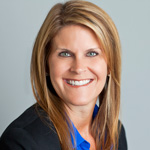Today, FCi Federal has over $100 million in revenue, but it’s been a long, difficult road to get here. I grew up humble, and before I knew it I was a single mom with two small kids at home. I had always wanted to work for myself, and I knew time was running out. I decided to quit my job and start my own business in my brother’s basement in 1991. I was twenty-eight years old, but I knew I could make it.
I built a marketing and consulting firm to help IT companies capture and win government contracts. The company grew, and things went very well for about a decade. Then, as huge companies started buying everyone, I watched my forty clients shrink to eighteen in eighteen months. I tried to regroup, I tried to restructure finances—but we were dying. I closed my office and moved back into my basement and decided to do something different.
I continued to support two large commercial clients, and I really reinvented the company by focusing on doing business directly with the federal government. I knew we could leverage IT and engineering skills to make processes more efficient, and I knew that would drive revenues while allowing us to operate in a fixed-price world. I started working on the vision, and in 2007 we had thirty-five employees. Eight years later, we have 3,100 employees and subcontractors that handle the back office work regarding credentialing and certification for federal agencies. We have twenty-five prime contracts with the Department of State and Department of Homeland Security. We gather all the information for applicants and prepare files for federal employees who then review information and make decisions accordingly.
In creating my business the second time around, I looked for a stable market that wouldn’t be impacted by the whims of congress or budgets or economics. I wanted to find a market with few competitors, and one that had a real mission. Most importantly, I wanted to find something where the barrier to entry was high. We handle very sensitive information, and all of my workers must pass background checks and have proper clearances. We’re not approving food stamps; we have to provide flawless services and help protect national security while we do so. We have to weed out fraud and make sure people aren’t terrorists.
In setting up FCi, I looked at all of these factors. The one thing I learned from my first company is that you have to always be changing. Look at yourself and make sure you are providing the best instead of just settling for status quo. You have to constantly change, grow, and improve. We had grown fat and happy in our first business. We weren’t looking around to see what our competitors were up to and finding new and innovative ways of doing things. We didn’t see the market decline coming. If you have something good in your life, you have to care for and invest in it.
The first time around, I didn’t care for my employees and consultants the way I should have. I didn’t focus on development, training, and career development—and I paid the price by losing very good employees to competitors. All that is different now. Anyone can hire clerks and have a normal model where people come to work and process applications, but not anyone can screen them for the ability to do the work and check their backgrounds to make sure they have the right fit to be successful at a specific agency.
We do that, and then we train people and implement processes to make them efficient and successful. We assess them for skills and make sure they’ll pass our clearance process because that shortens time to hire and fill positions. Big companies use staffing companies and suffer high turnover rates. It’s a waste of money. Our nationwide average tenure is 4.5 years, and we have a turnover rate under 9 percent compared to an industry average of 37 percent.
We retain employees because we share 20 percent of all profits to fund our employee and manager bonus programs, and we have a culture of coaching, accountability, and collaboration. We have to have buy-in because we can’t produce what we need if our employees don’t believe in us. I was at our site in Kentucky recently, and I personally pulled managers and clerks from the floor for impromptu interviews because I have to make sure they get this. We have annual meetings, and webinars, and conference calls to focus on culture. If we have workers that don’t care and don’t feel like they have a voice, then all they are doing is processing paperwork. They get sloppy, we lose production, and customers see it. It’s part of a slippery slope. We set goals around quality, production, and customer satisfaction. We evaluate people on their attitudes, happiness at work, and commitment level. At the management level, we add to that staff morale and program growth, and we do monthly internal reviews on all projects. If you take care of your employees and quality, production and profits take care of themselves.
Simply put, we create disciples. Our leaders know our culture, and they take that to their teams. We randomly bring employees to our corporate offices, flying them out to Virginia to have lunch with me, spend time in DC, and tour our sites. They go back to their home bases and become our advocates in the company. Our leaders will also fly to other offices and serve cookies, or have town hall meetings and talk about issues. Transparency and preserving culture are constant themes.
Our employees have to understand—and personally believe—that what they are doing is important, and if they do, they’ll give us all they’ve got. Every job is vitally important to the mission of this company and to mission of the agency they serve. We’re processing information that is of critical importance to people seeking citizenship, or asylum, or some other credential. Every file, every piece of paper we touch, represents a real person in pursuit of something important. If we misroute something in the mail room, then it doesn’t get to the adjudicator in time, and a benefit is delayed. If a mariner doesn’t get his license in time, he misses fishing season, the boat leaves, and his family doesn’t eat.
Even now, as things are going well, we know we have to evolve. Organizations are living things—they have to change to grow. Nothing stays the same—not the market, the customers, or the needs. We have to be flexible, agile, and open-minded. We have thousands of children trying to cross the border into America. In response, we’ve had to increase staff support by 50 percent on the border state offices in the past three months to handle the workflow. We’re prepared to change our processes to hire workers and streamline things so we can handle these new demands.
We intend to be a $300 million company by the end of 2017, and that will take about 5,000 new employees. We’re putting in place a regional management structure, and we need to develop a regional HR structure. We need to push more management and
autonomy out to the field. In this growth, the most important thing will be to maintain our culture of collaboration and our goal of employee enrollment. We have a lot ahead of us, and in 2015, I’m looking to make a key acquisition to bring a new market to FCi. Growth is the key to everything

